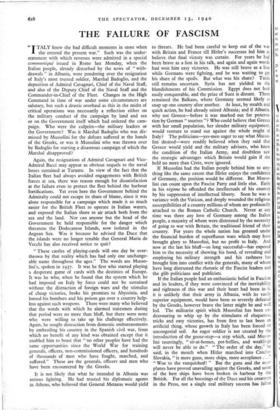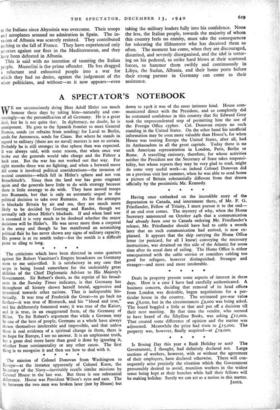THE FAILURE OF FASCISM
" y TALY knew she had difficult moments in store when -I- she entered the present war." Such was the under- statement with which reverses were admitted in a special communiqué issued in Rome last Monday, when the Italian people, already disturbed by the news of " with- drawals " in Albania, were pondering over the resignation of Italy's most trusted soldier, Marshal Badoglio, and the deposition of Admiral Cavagnari, Chief of the Naval Staff, and also of the Deputy Chief of the Naval Staff and the Commander-in-Chief of the Fleet. Changes in the High Command in time of war under some circumstances are salutary, but such a drastic overhaul as this in the midst of critical operations was necessarily a reflection either on the military conduct of the campaign by land and sea or on the Government itself which had ordered the cam- paign. Who were the culprits—the military leaders or the Government? Was it Marshal Badoglio who was dis- missed by Mussolini for the defeats suffered at the hands of the Greeks, or was it Mussolini who was thrown over by Badoglio for starting a disastrous campaign of which the Marshal disapproved?
Again, the resignations of Admiral Cavagnari and Vice- Admiral Bacci may appear as obvious sequels to the naval losses sustained at Taranto. In view of the fact that the Italian fleet had always avoided engagements with British forces at sea, there was reason enough for dissatisfaction at the failure even to protect the fleet behind the harbour fortifications. Yet even here the Government behind the Admiralty could not escape its share of blame, since it was alone responsible for a campaign which made it so much easier for the British Fleet to operate in Italian waters, and exposed the Italian shore to air attack both from the sea and the land. Nor can anyone but the head of the Government be held responsible for the danger which threatens the Dodecanese Islands, now isolated in the Aegean Sea. Was it because he advised the Duce that the islands were no longer tenable that General Maria de Vecchi has also received notice to quit?
"These castles of playing-cards will one day be over- thrown by that reality which has had only one unchange- able name throughout the ages." The words are Musso- lini's, spoken in 1937. It was he first who started playing a desperate game of cards with the destinies of Europe. It was he who, when he found that the system which he had imposed on Italy by force could not be sustained without the distraction of foreign wars and the stimulus of cheap victories, broke his promises to Abyssinia, and loosed his bombers and his poison gas over a country help- less against such weapons. There were many who believed that the words with which he alarmed statesmen during that period were no more than bluff, but there were none who were willing to take up his challenge effectively. Again, he sought distraction from domestic embarrassments by embroiling his country in the Spanish civil war, from which no benefit of any kind was obtained except that it enabled him to boast that "no other peoples have had the same opportunities since the World War for training generals, officers, non-commissioned officers, and hundreds of thousands of men who have fought, marched, and suffered." These are the generals, officers and men who have been encountered by the Greeks.
It is not likely that what he intended in Albania was serious fighting. He had trusted his diplomatic agents in Athens, who believed that General Metaxas would yield to threats. He had been careful to keep out of the war with Britain and France till Hitler's successes led him to believe that final victory was certain. For years he had been brave as a lion in his talk, and again and again words had won him easy victories. He was still brave as a lion while Germans were fighting, and he was waiting to get his share of the spoils. But what was his share? Tunis still remains uncertain. Syria has not yielded to the blandishments of his Commission. Egypt does not look easily conquerable, and the prize of Suez is distant. There remained the Balkans, where Germany seemed likely to snap up one country after another. At least, by stealth and quick action, he had already seized Albania; and if Albania, why not Greece—before it was marked out for penetra- tion by German " tourists "? Who could believe that Greece with her small population, her slender military equipment, would venture to stand out against the whole might of Italy? The politicians—yes-men eager to say what Musso- lini desired—were readily believed when they said that Greece would yield and the military advisers, who knew the condition of the Italian Army, and doubtless saw the strategic advantages which Britain would gain if she held no more than Crete, were ignored.
If Mussolini had the Italian people behind him to any- thing like the same extent that Hitler enjoys the confidence of Germany,. the position would be different. But Musso- lini can count upon the Fascist Party and little else. Early in his regime he offended the intellectuals of his country by his suppression of intellectual liberty. Soon he was at variance with the Vatican, and deeply wounded the religious susceptibilities of a country millions of whom are profoundly attached to the Roman Catholic Church. Never at any time was there any love of Germany among the Italian people, a majority of whom were distressed by the necessity of going to war with Britain, the traditional friend of their country. For years the whole nation has groaned under the financial burden of superfluous wars which may have brought glory to Mussolini, but no profit to Italy. And now at the last his bluff—so long successful—has exposed him to the necessity of showing his hand, of revealing and employing his military strength and his rashness has brought him into conflict with the generals, many of whom have long distrusted the rhetoric of the Fascist leaders and the glib politicians and publicists.
If the Italian people had an enthusiastic belief in Fascism and its leaders, if they were convinced of the inevitability and rightness of this war and their heart had been in it, it is unlikely that their army in Albania, with its vastly superior equipment, would have been so severely defeated by the Greeks, however brave the latter might be and well led. The militarist spirit which Mussolini has been en- deavouring to whip up by the stimulants of eloquence, tricks and easy victories, has from first to last been an artificial thing, whose growth in Italy has been forced on uncongenial soil. An eager soldier is not created by the introduction of the goose-step—a step which, said Musq3- lini tauntingly, "sit-at-homes, pot-bellies, and weaklings will never be able to do." "The order of the day," he said, in the month when Hitler marched into Czecho- Slovakia, "is more guns, more ships, more aeroplanes .. ." "Woe to the vanquished! " But the guns and the aero- planes have proved unavailing against the Greeks, and some of the best ships have been broken in harbour by the British. For all the boastings of the Duce and his creatures in the Press, not a single real military success has fallen to the Italians since Abyssinia was overcome. Their troops and aeroplanes aroused no admiration in Spain. The in- va,ion of Albania was scarcely resisted. They contributed nothing to the fall of France. They have experienced only reverses against our fleet in the Mediterranean, and they have been defeated in Albania.
This is said with no intention of taunting the Italian people. Mussolini is th& prime offender. He has dragged a reluctant and exhausted people into a war for which they had no desire, against the judgement of the wiser politicians, and without—as it now appears—even taking the military leaders fully into his confidence. None the less, the Italian people, towards the majority of whom this country feels no enmity, must take the consequences for tolerating the filibusterer who has deceived them so often. The moment has come, when they are discouraged, disunited, and severely disorganised, and the idol is totter- ing on his pedestal, to strike hard blows at their scattered forces, to hammer them swiftly and continuously in Libya, the Sudan, Albania, and their home ports before their strong partner in Germany can come to their assistance.











































 Previous page
Previous page